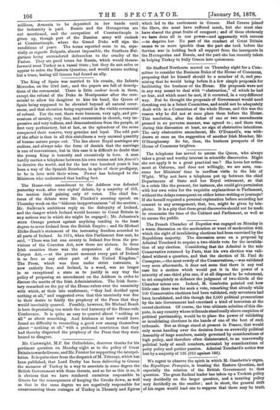The Home-rule amendment to the Address was defeated yesterday week,
after two nights' debate, by a majority of 253, the motion itself gaining only 48 votes. The chief fea- tures of the debate were Mr. Plunket's amusing speech on Thursday week on the "hideous inopportuneness "of the motion ; Mr. Sullivan's ambitious reply on the disloyalty of Ireland, and the danger which Ireland would become to Great Britain in any serious war in which she might be engaged ; Mr. Johnston's stern Orange protest against anything tending in the least degree to sever Ireland from the British Empire ; and Sir Michael Hicks-Beach's statement of the increasing freedom accorded to all parts of Ireland. In 1874, when this Parliament first met, he said, "There was but one county in Ireland free from the pro- visions of the Coercion Act, now there are sixteen. In three Irish counties there was the suspension of the Habeas Corpus Act, — at the present moment every part of Ireland is as free as any other part of the United Kingdom." The Press, which was then under strict restraints, is now entirely free, and Ireland, in a word, was no longer in so exceptional a state as to justify in any way the policy of proposing an amendment on the Address in order to discuss the merits of the Irish Administration. The Irish Secre- tary remarked on the joy of the Home-rulers over the unanimity with which, at their late conference, "they had decided upon nothing at all," and suggested even that this unanimity was due to their desire to falsify the prophecy of the Press that they would inevitably quarrel. Possibly, however, Sir Michael Beach is here depreciating too much the real harmony of the Home-rule Conference. It is quite as easy to quarrel about "nothing at all" as about something. And Irishmen at least would have found no difficulty in reconciling a good row among themselves about "nothing at all," with a profound conviction that they had thereby disproved the prophecy of the Press that they were bound to disagree.


































 Previous page
Previous page